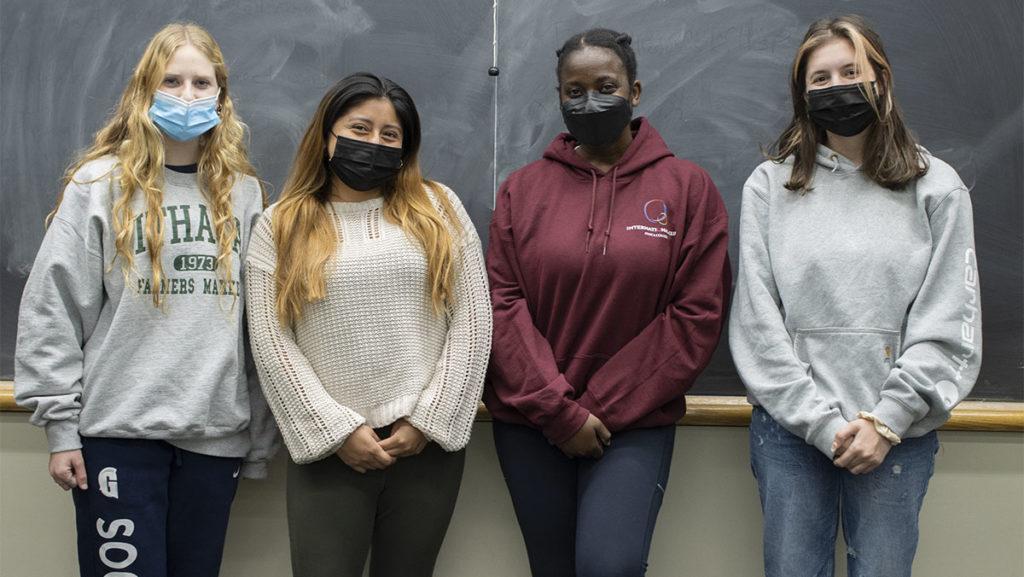Although Ithaca College does not have a veterinary program, the dedicated members of the IC Pre-Vet Society aim to help students interested in the veterinary field apply to veterinary school and find shadowing opportunities in the community to achieve their dreams.
The club was originally formed in 2015, but was reinstated for the fall semester under an entirely new executive board. Only 33 colleges in the United States, including Cornell University, have a veterinary program in comparison to the 157 medical schools available. Ithaca College is not one of them. The scarcity of these schools leads to a competitive applicant pool, meaning applicants need to stand out, and the Pre-Vet Society aims to provide its members with the resources to do so.
The new executive board held its first meeting Sept. 14, but have planned a number of events for the semester. The members held a panel Oct. 12 with two alumni: Morgan Van Dyx, a veterinary student at the Ohio State University, and Suzette Moschettib, program coordinator of Maddie’s Shelter Medicine at Cornell. The panel was held to give members more of an insight into veterinary school and the world of veterinary medicine. Senior Viviana Perez, the club’s director of programming, said the members are also thinking of taking a trip to the Rosamond Gifford Zoo in Syracuse, New York, and collaborating with Guiding Eyes for the Blind — a club at the college that provides individuals who are blind or visually impaired with trained guide dogs.
Senior Khangelani Mhlanga, president of the Pre-Vet Society, said one of the goals of the club is to establish connections with different organizations and hospitals so that members have volunteer opportunities.
“There are already fewer options and there’s also a major university on the other side of the hill that’s also looking to get opportunities and so members really benefit from having an established connection,” she said. “You know, if you are in the Pre-Vet Society you volunteer every Saturday or something … The ideal situation would be that we would partner with a clinic or two and then have a long-running volunteer list where people have access.”
Another goal of the club is to form relationships between seniors and freshmen interested in veterinary school so that information can be passed down to better prepare members for the application process. Mhlanga said since there is no veterinary major at the college, it is really up to students to seek out opportunities for themselves, and they may be unaware of where to look or how to get started.
Junior Emily Kopecky, treasurer of the club, said that working over the summer as a veterinary assistant at Garden State Veterinary Services, a veterinary hospital in Iselin, New Jersey, was the best experience of her life.
“I learned under the supervision of technicians, I learned how to inject meds, I learned how to place IVs, it was insane how much I learned with only an entry-level job,” she said. “I think after that experience and meeting amazing people and being able to talk to them about the same interests that I have, I think it was a lightbulb in my head that this was what I really want to do.”
Mhlanga said that being an international student, she can understand the difficulties of adjusting to a new environment, like moving away for college and having to find opportunities independently, which is one of the reasons why she wants to help members of the club gain experience.
“When I came, I was just thinking that the only way I could get experience was if I go to a clinic, I didn’t think about going to a lab or becoming a rehabilitator, which I am now,” she said. “I didn’t even know wildlife rehabilitators were a thing here in Ithaca, but there are so many of them and they are willing to take in volunteers … That was an option I could have started my first year, but I didn’t know that it even existed.”
Those interested in the veterinary field could start off by going to a two-year vet tech program and get their vet tech license before applying to vet school or they can get their bachelors in a separate degree and fulfill the necessary prerequisites for applications, Perez said. The biology major at the college fulfills the prerequisites for many of the schools, Kopecky said, and students also have the option of taking more veterinary-specific courses at Cornell University through the IC-CU Exchange Program. In order to register for classes at Cornell students must fill out the IC-CU exchange petition, fulfill Cornell’s local exchange program requirements which includes being registered for at least 12 credits at Ithaca College, and complete the visitor registration form on the Cornell website.
Ian Woods, associate professor in the Department of Biology and the club advisor, said it is possible to major in anything and still go to vet school as long as the necessary prerequisites are filled.
“All our bio majors are able to get hands-on research experience as part of our bio curriculum, and many of our labs use animals in research, so our pre-vet students have lots of opportunities to prepare and gain skills and experience,” he said. “IC has been highly successful in terms of its students being admitted to vet school.”








